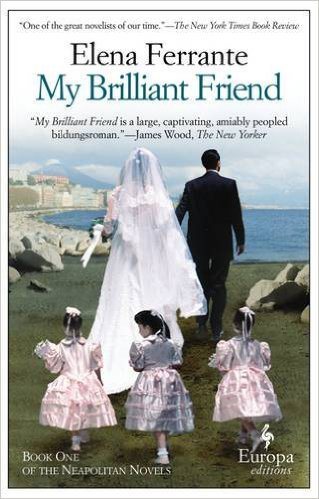Elena Ferrante: My Brilliant Friend
Elena Ferrante: My Brilliant Friend
Readers of my blog will know that I have been interested in Naples for some time, reading and reviewing a number of memoirs and novels set in the 1943-44 period, when Allied armies occupied the city. This book charts the life of two young girls, born around that time, growing up in a poor district in the late 1940s and 1950s, experiencing the gradual increase in affluence that accompanied post war economic recovery.
One of the delights of the book is the light touch with which the author shows the effects of the recent history of Naples, as it becomes clear that the girls and other children of the various families involved are, as they grow up, playing out the fault lines, hatreds, alliances, patterns of violence, that developed between their parents during the earlier Fascist period and the Allied occupation. Of this time their parents say very little, since in many cases their actions remain deeply shaming, yet they have clearly shaped the lives and friendships of their children.
I found it an immersive read, genuinely a book that I found difficult to put down. I was not expecting this, and am even now struggling to explain to myself why this book was so captivating.
Even as I write that I am wondering about who the title refers to. While the book encourages us to see Lina as the brilliant one, in fact it is Lina who calls Elena, the narrator, ‘brilliant.’ And Elena is indeed clever, going to high school and gaining the plaudits of her teachers for her exceptional academic performance, while Lina, whose narrow-minded parents will not allow her to pursue her education in spite of pressure from her teacher, stays working at her father’s shoe-making shop, pursuing an informal programme of reading and study in which she excels, spurring Elena on to greater efforts at her studies so that she can outshine her friend.
The two girls are intensely rivalrous, over both scholastic success and over their looks and their acquisition of boyfriends. Elena’s competitive feelings are very evident to the reader, since she is the narrator, but Lina’s reported actions and words show her to be just as jealous of her friend, so that the two are continually trying to outperform each other.
Yet rivalry is not the only quality of their relationship – how could it be? In fact, the girls share a bond of friendship that appears them deeper than the relationships either can have with any of the boys/men in their neighbourhood. At one point the love Elena feels for her friend even seems sexualised, though this restrained by an environment in which the open expression of sexual desire, is subject to an overpowering code of repression and regulation through violence, mostly involving a cast of authoritarian and machismo men and boys, as much as through matriarchal authority and disapproval.
It is tempting to read the book as an autobiography since the narrator, Elena Greco, has the same first name as the author and it is clear that her teenage ambition is to be a writer. Very little is known about Ferrante, who shuns all publicity, except that she grew up in Naples. The emotional intensity of the writing and the level of detail about the neighbourhood she portrays suggest someone who is recollecting events from personal experience.
The novel is not plot-driven, so that the involvement I felt as a reader was not due to any overall narrative tension making me what to know ‘what happens next,’ although episodes occur which have a story-like qualities (a beginning, a middle and an end), such as the story of Elena’s trip to Ischia, or the story of a firework battle, or of a trip made by the teenagers to a posh part of Naples. Yet I found the connection I felt with the two young girls as they grew up led to an overpowering wish to know their fates. For that reason I will certainly be reading the other three books in the series charting the subsequent lives of the same two characters.
The post Elena Ferrante: My Brilliant Friend appeared first on Interrogating Ellie.




